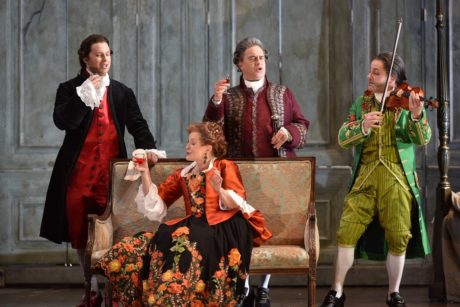Mozart’s The Marriage of Figaro (Le nozze di Figaro) is such a perfect amalgam of comedy and pathos that audiences will cheer even a flawed performance of it. It’s hard to get everything right, with ten complicated characters, an orchestra, and sets representing multiple rooms and gardens of a nobleman’s palace.

That’s why it was such a rare treat to see the all-around excellence of this new production which has sets and costumes by Leslie Travers and direction by Stephen Lawless. It’s a co-production of Opera Philadelphia, Lyric Opera of Kansas City, San Diego Opera and Palm Beach Opera, although each company is choosing its own conductor and cast.
Corrado Rovaris led the orchestra here, and the cast was filled with superb singers and actors.
The story comes from a 1778 French play by Pierre Beaumarchais which was full of slapstick comedy while it denounced aristocratic privilege on the eve of the French Revolution. In 1786 it became an opera by the Italian librettist Lorenzo da Ponte and the Austrian composer Wolfgang Amadeus Mozart. The two of them underlined the laughable mistaken identities and misunderstandings, while adding human fears, sadness and anger. It was the greatest collaboration of those two theatrical giants.
Massive sets portrayed the ornate exterior of a grand palazzo and its lavish rooms, and ingeniously revealed the corridors which connect them. Much of the action involved people skulking down those corridors and listening-in at doors. Neither Travers nor Lawless tried to alter the original period; there was none of the pointless time-shifting that afflicts many new productions of old classics. Why try to tamper with a story that so fits its late-18th-century setting when new freedoms were sweeping the civilized world?

Wealthy Count Almaviva (John Chest) has a lovely wife (Layla Claire) but carries on sexual alliances with several of his servants and with the teenaged daughter of his gardener. The count’s chief manservant, Figaro (Brandon Cedel) is about to marry the countess’s maid Susanna (Ying Fang) and Almaviva, with false generosity, sets them up in a bedroom adjoining his own. Susanna is savvy enough to see that the count wants to have quick access to her for sex when Figaro is away from the room.
Lawless’s direction includes many sexual references without resorting to crudeness. The countess reveals, through glances and hesitations, that she’s attracted to the teenaged boy Cherubino (played as usual by a woman, Cecelia Hall), while Cherubino lusts after every female he meets.
The countess is a pathetic character who is fully aware of her husband’s infidelities. She pours out her soul in Porgi, amor, qualche ristoro – “Grant, love, some comfort” in act II and Dove sono i bei momenti – “Where are they, the beautiful moments” in act III. Susanna, the countess, and Figaro set in motion a plot to humiliate the count and, when that’s done, he has a rare moment of remorse and sings Contessa, perdona – “Please forgive me.”
Rovaris had the orchestra take a delicious moment of silence here before the countess responded that she, as a woman, can be more understanding than any man, and she pardons him. In this production, we get the feeling that her forgiveness is for this offense only, and he better be on guard in the future. His days of autocratic entitlement are numbered.
Fang had many appealing scenes as the clever Susanna, including her aria Deh vieni, non tardar – “Oh come, don’t delay”). Hall enchanted with her breathless Non so più – “I don’t know what I am”, and Cedel was totally charming as Figaro, especially in his catchy taunting of the count, Se vuol ballare – “If you want to dance.”
Even the supporting players, enablers in the count’s retinue, were outstanding: Patrick Carfizzi, Jason Ferrante and Lucy Schauffer.
Rovaris had the orchestra pit raised so his head was level with those of audience members as he conducted from his harpsichord. It added intimacy to the production.
Running Time: Approximately two hours and 45 minutes, including one intermission.
The Marriage of Figaro plays through May 7, 2017, and is presented by Opera Philadelphia, performing at the Academy of Music – Broad and Locust Streets, in Philadelphia, PA. For tickets, call (215) 893-1018, or purchase them online.




